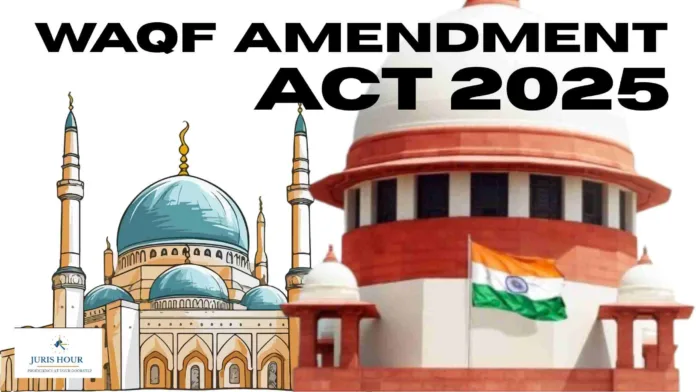The Supreme Court says that it is proposing to pass an interim order as follows in the petitions challenging the Waqf Amendment Act 2025 :
- The properties declared by Courts as Waqfs should not be de-notified as Waqfs, whether they are by waqf-by-user or waqf by deed, while the Court is hearing the challenge to the Waqf Amendment Act 2025.
- The Court further orders that the proviso of the Amendment Act, as per which a Waqf property will not be treated as a Waqf while the Collector is conducting inquiry whether the property is a Government land, will not be given effect to.
- The Court also says that all Members of the Waqf Boards and Central Waqf Council must be Muslims, except the ex-officio members.
The Supreme Court of India has officially commenced hearings on a batch of petitions challenging the Waqf (Amendment) Act, 2025, raising significant constitutional and religious freedom concerns. The matter is being reviewed by a three-judge bench led by Chief Justice Sanjiv Khanna, along with Justices Sanjay Kumar and K.V. Viswanathan.
Key Highlights from the Supreme Court Hearing on Waqf Act
1. Scrutiny of ‘Waqf by User’ Clause
One of the major concerns is the removal of the concept of ‘waqf by user’ — properties considered waqf due to long-standing public religious use. The bench questioned how historical religious sites, especially mosques established centuries ago, could be expected to produce registered ownership documents. CJI Khanna observed that de-notifying such properties could lead to serious legal and social implications.
2. Non-Muslim Representation in Waqf Boards
The amended law permits non-Muslims to be part of Waqf Boards, prompting the court to question the legislative intent. The bench posed a pointed query to the Central Government: “Would you allow Muslims to be appointed in Hindu religious trusts?”—highlighting concerns about parity and religious autonomy.
3. District Collector’s Role in Property Disputes
The amendment gives District Collectors the power to adjudicate disputes over waqf properties. Representing the Centre, Solicitor General Tushar Mehta argued that this provision merely allows local authorities to verify ownership status, especially in cases involving government land.
Government’s Stand on the Waqf Amendment Act
Defending the legislation, the Solicitor General emphasized that the Waqf Act amendments aim to improve transparency and accountability in waqf property administration. He noted that judicial review remains unaffected, with tribunals consisting of judges and experts in Muslim personal law.
Petitioners’ Concerns on Minority Rights
The challenge is backed by several political figures and legal experts, including AIMIM leader Asaduddin Owaisi and Congress MP Mohammad Jawed. Arguing on behalf of the petitioners, Senior Advocate Kapil Sibal contended that the amendments infringe on religious practices and minority rights. “How can the State dictate religious inheritance laws?” he questioned, referring specifically to the abolition of waqf by long-term use.
Next Hearing Date
The apex court has scheduled the next hearing for Thursday, April 17, 2025, to continue its examination of these pivotal legal and constitutional issues.

